The colour changing packaging market is gaining steady traction, driven by rising demand for intelligent packaging solutions that enhance user interaction, ensure product safety, and improve shelf visibility. Innovations in functional inks, smart label systems, and printable thermochromic or photochromic dyes have expanded the range of applications in industries seeking both aesthetic differentiation and functional performance.
Press releases from packaging firms and updates from food and healthcare sectors have emphasized the utility of colour changing packaging in improving supply chain transparency and indicating product freshness or temperature thresholds. As consumer awareness around food safety and product integrity rises, industries are leveraging packaging as a communication tool.
Regulatory bodies have also supported the use of intelligent packaging to reduce waste and minimize health risks by promoting clear indicators of spoilage or storage compliance. Looking ahead, market growth is expected to be led by greater adoption in food applications, dominance of plastic as the preferred base material, and growing use of thermal sensitive technologies that visually signal changes in product condition or environment.
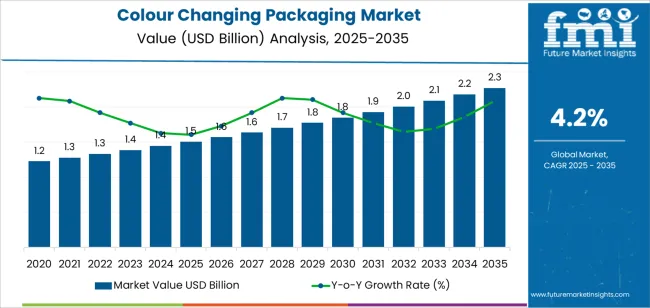
| Metric | Value |
|---|---|
| Colour Changing Packaging Market Estimated Value in (2025 E) | USD 1.5 billion |
| Colour Changing Packaging Market Forecast Value in (2035 F) | USD 2.3 billion |
| Forecast CAGR (2025 to 2035) | 4.2% |
The market is segmented by Material, Technology, and End Use and region. By Material, the market is divided into Plastic, Paper, Metal, Glass, and Biodegradable Materials. In terms of Technology, the market is classified into Thermal Sensitive, Humidity Sensitive, Chemical Sensitive, and UV Sensitive. Based on End Use, the market is segmented into Food, Beverages, Pharmaceutical, Cosmetics, Agriculture, Healthcare, and Industrial Chemical. Regionally, the market is classified into North America, Latin America, Western Europe, Eastern Europe, Balkan & Baltic Countries, Russia & Belarus, Central Asia, East Asia, South Asia & Pacific, and the Middle East & Africa.
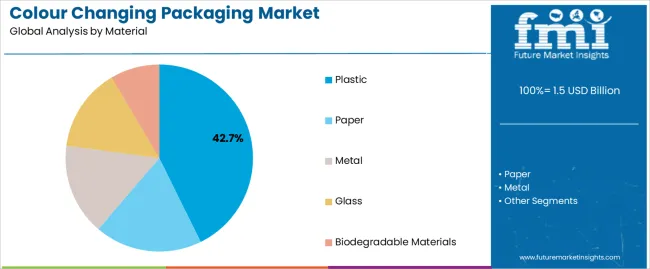
The Plastic segment is projected to account for 42.7% of the colour changing packaging market revenue in 2025, maintaining its lead due to its versatility, cost-efficiency, and compatibility with active pigments and indicator coatings. Plastic substrates have been favored by packaging converters for their adaptability across thermoforming, printing, and lamination processes, making them ideal for integration with thermochromic and photochromic elements.
Packaging industry developments have highlighted that plastics such as PET and PP are widely used in food, beverage, and personal care packaging due to their barrier properties and recyclability. Moreover, plastics offer excellent print adhesion for smart inks and dyes, enabling clear and responsive colour changes.
As companies increasingly focus on sustainable variants like bio-based and recyclable plastics, this material segment is expected to retain its dominance by offering a balance of performance, printability, and affordability within the evolving smart packaging ecosystem.
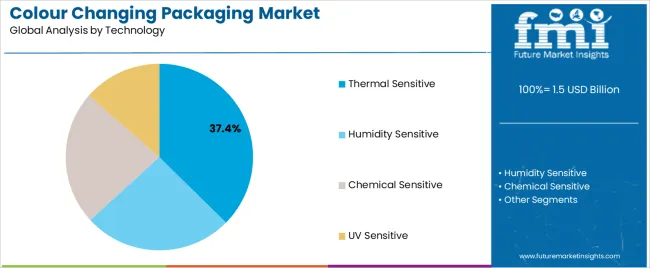
The Thermal Sensitive segment is expected to contribute 37.4% of the market revenue in 2025, leading the technology landscape due to its effective temperature-responsive functionality and increasing deployment in consumer-centric applications. This segment’s growth has been fueled by the demand for temperature indication in cold-chain logistics, ready-to-eat food items, and pharmaceutical products.
Thermal sensitive inks and pigments are engineered to change color at predefined thresholds, offering a visual cue that a product has been exposed to temperature deviations. Packaging innovations showcased at trade expos and in industry journals have underscored the technology’s potential to reduce spoilage and enhance user experience by communicating freshness and safety.
Additionally, its non-invasive nature and relatively low integration cost have enabled widespread adoption across flexible and rigid packaging formats. With the food and healthcare sectors tightening compliance around storage conditions, thermal sensitive technologies are poised to expand further as a preferred smart packaging solution.
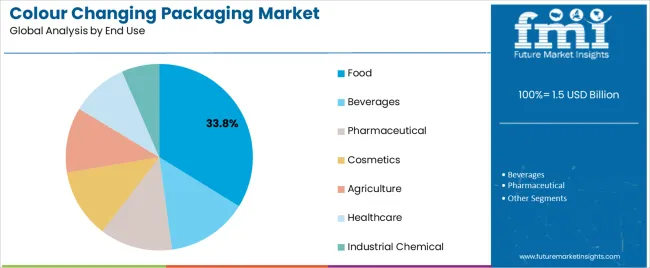
The Food segment is projected to hold 33.8% of the colour changing packaging market revenue in 2025, reflecting its dominant role in adopting smart packaging technologies for safety, quality, and consumer engagement. Growth of this segment has been propelled by rising demand for visual freshness indicators, spoilage alerts, and temperature-sensitive labels in perishable food categories.
Industry regulations and retailer requirements for enhanced food safety and traceability have encouraged manufacturers to adopt colour changing packaging to meet compliance standards and reduce wastage. Additionally, consumer preferences for transparency in food packaging have driven innovations that communicate quality in real time.
Food companies have incorporated colour changing elements to convey cooking readiness, expiration warnings, or proper storage conditions. As the global food supply chain becomes more complex, the Food segment is expected to maintain its lead by leveraging colour changing packaging to strengthen consumer trust, support brand differentiation, and extend product shelf life.
Embracing Sustainability through Smart Sensors for the Colour Changing Packaging Market
The colour changing packaging market is poised for a significant evolution helmed by the integration of smart sensor technology. These next-generation solutions promise a future where colour changing packaging goes beyond aesthetics and becomes a champion of sustainability.
Intelligent packaging that utilizes embedded sensors to detect not just temperature or pressure changes but also factors like gas emissions or spoilage indicators specific to particular food items. Companies like Tetra Pak and Dow are actively exploring such possibilities. This level of sophistication allows for customized colour changes that provide consumers with highly accurate information about the product's freshness.
Such endeavor decrypts into a reduction in food waste, a major environmental concern. Consumers empowered with real-time information can make informed choices, extending the shelf life of edible items and minimizing unnecessary discards.
Likewise, smart sensors can be designed to trigger colour changes based on the packaging's end-of-life cycle. Envisioning a coffee pouch that transforms colour when it's ready for recycling prompting consumers to dispose of it responsibly. Companies such as Unilever and Procter & Gamble are increasingly prioritizing sustainable packaging solutions, and colour changing packaging with integrated sensors aligns perfectly with this commitment.
By integrating smart sensors, the colour changing packaging market can not only enhance food safety and consumer experience but also become a powerful tool for promoting environmental responsibility. This innovative approach cultivates a win-win situation for all stakeholders, solidifying colour changing packaging as a sustainable and dynamic force in the future of the food and beverage industry.
Innovative Monitoring of Perishable Products Buds with the Colour Changing Packaging
With developments in perishable products monitoring, there is potential for disruption in the colour changing packaging industry. In the future, when food waste is reduced and shelf life is maximized with the help of colour changing packaging. Research institutes and corporations such as Walmart and Carrefour are actively working together to create advanced colour changing packaging solutions. This cutting-edge packaging is likely to be able to track the condition of perishables like fresh food.
Subtle temperature changes or the release of ethylene gas, a ripening agent, can cause colour variations in food that reveal important information about how fresh the product is. Retailers can improve storage conditions and consumers may make well-informed shopping selections with the help of this real-time information. This corresponds to a noteworthy decrease in food waste, an urgent ecological issue.
As research and development activities ramp up, anticipate the colour-shifting packaging industry to transform the way we monitor and handle perishable commodities, resulting in a more sustainable and efficient food supply chain.
Technical Difficulties and High Operational Costs Can Undermine the Market
The elements impeding the growth of the colour changing packaging market, however, are high operational costs and a downturn in the package production industry. The utilization of specific chemicals and manufacturing techniques in the creation of colour changing materials might result in higher production costs when compared to conventional packaging materials.
Because it is challenging to establish consistency in durability, compatibility, and colour changes with a variety of packaging materials, the development and implementation of colour changing packaging materials are technically demanding. Applying the colour changing packaging needs skill, which might provide obstacles. These technological difficulties and financial factors may disturb certain brands and the market, particularly those with tight budgets.
From 2020 to 2025, the colour changing packaging market rose at a consistent 3.2% CAGR. The industry's value increased from USD 1,188.2 million in 2020 to USD 1,390.8 million in 2025 because of the market growth trend. In the arena of colour changing packaging, the elevation in market valuation suggests a favorable and encouraging trend.
The colour changing packaging market is thriving due to the textile and apparel industry's growth in the empirical period. The demand for innovative packaging solutions is generating opportunities for colour changing technology. This can enhance consumer experience and boost brand engagement in the apparel market by allowing garment bags to change colour based on size or showcase different styles within the same box.
The global epidemic, however, caused a short pause in the industry in 2024. The epidemic not only forced the closure of several end-user companies but also hampered transnational trade and the flow of goods, which had an additional negative impact on the market.
Cost-effectiveness became a top concern for many firms after the epidemic, which increased demand for less expensive colour changing packaging. In addition, following the epidemic, foreign trade rapidly recovered in 2024 and 2025.
Furthermore, producing vivid and long-lasting colour changing package designs is becoming easier because of developments in printing technology. This enables companies to use colour changing packaging to create visually striking images that enhance their brand image in addition to practical uses. The creation of environmentally friendly packaging solutions with colour changes is something that looks promising for the future.
Eco-friendly solutions are becoming more and more appealing to customers as environmental consciousness rises. The colour changing packaging market is well-positioned to benefit from this trend by providing creative and environmentally friendly packaging that meets the demands of the textile and clothing industries on both a functional and environmental level.
Tier 1 firms hold a significant portion of the global market share. These market leaders offer a wide range of items and a high manufacturing capacity. They specialize in creating and reconditioning goods in various package designs. They serve a significant consumer base across a large geographic area. Notable Tier 1 companies with a broad variety of series offerings and regulatory compliance are Avery Dennison and Toray.
Tier 2 companies and the notable global reach and comprehension of the industry set them apart. A wider international reach and access to state-of-the-art technology would be advantageous for established regional players like Sappi, Stora Enso, and Mondi.
Tier 3 refers to small enterprises in specialized industries primarily serve local needs. Because of their perceived need for more organization and a larger global reach, these firms demand a greater degree of formalization and comprehensive structure than their structured competitors. This category consists of emerging companies such as Verallia, Owens-Illinois, Ball Corporation, Toyo Seikan category, Graphic Packaging, and Owens-Illinois. These businesses must broaden their geographic scope in order to satisfy the demands of the regional market.
The industry analysis for the various countries' colour changing packaging sector is included in the section below. It is projected that the United States is likely to continue to lead North America with a compound annual growth rate of 4.1% until 2035. By 2035, the industry in China is envisioned to grow at a CAGR of 4.3%, while India is divined to see a CAGR of 4.4% in Asia Pacific.
| Countries | Value CAGR (2025 to 2035) |
|---|---|
| United States | 4.1% |
| Canada | 4% |
| United Kingdom | 3.8% |
| Germany | 3.9% |
| India | 4.4% |
| China | 4.3% |
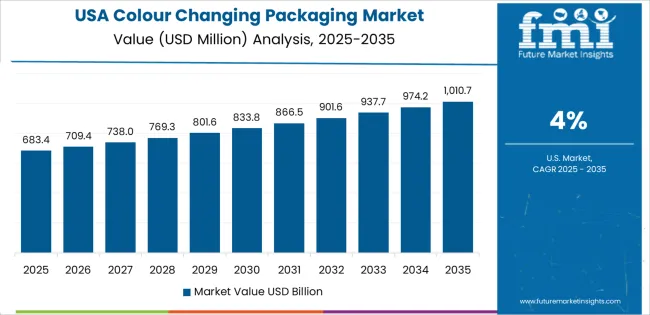
Players in the United States are focusing on innovation in the healthcare infrastructure and the need for colour changing packages for drugs and vaccines to ensure its credibility. The industry is anticipated to exhibit a CAGR of 4.1% in the United States by 2035.
Colour changing packaging is expected to revolutionize the United States pharmaceutical industry by improving the efficacy and integrity of pharmaceuticals that are sensitive to changes in colour. To assure the security and longevity of necessary medications, companies such as Pfizer and Merck are investigating such packaging techniques.
One notable advancement in healthcare is colour changing packaging, which warns patients and medical personnel of possible drug problems before they are administered. For specialty medications and vaccines, it offers extra security, enhancing patient safety and a strong healthcare system. The market is anticipated to grow into a crucial instrument for the United States pharmaceutical sector as research and development advances, guaranteeing the secure and efficient distribution of life-saving drugs.
The colour changing packaging integration with smart sensor technology for shelf life management and responsible consumer behavior, is expected to help India’s cosmetics and personal care sector. Throughout the projected period, the demand for colour changing packaging in India is anticipated to report a CAGR of 4.4% through 2035.
In India, companies such as Hindustan Unilever and Dabur are investigating the application of colour changing cosmetic containers. These containers change colour as a product approaches its expiration date, giving customers the information they need to choose how much of the product to use.
Colour changing packaging is a sustainable and user-friendly solution for the Indian cosmetics and personal care industry, offering a layer of security for heat-sensitive cosmetics. This innovative technology empowers consumers and safeguards product integrity, fostering a more responsible and informed beauty sector in India. The demand is expected to grow significantly in the coming decade.
China's status as a global manufacturing leader is driving the demand for colour changing packaging, especially in the beverage industry. Leading the way in innovation are Chinese producers who are creating unique colour changing products that adjust according to the temperature of the product.
China's beverage companies, Mengniu Dairy and Yili Group, are implementing colour changing packaging to indicate the ideal drinking temperature. This innovative approach not only enhances consumer experience but also reinforces brand identity through visually appealing packaging. Cold beverages can be triggered to change to blue, while hot drinks can be changed to red.
As Chinese manufacturers refine their colour changing technology, expect a surge in demand for these innovative solutions. The beverage industry is just the beginning; the colour changing packaging market holds immense potential across various sectors. China's manufacturing prowess is poised to play a vital role in shaping this exciting future. To gain an edge, several manufacturers in the market are targeting China, which is estimated to rise at a CAGR of 4.3% during the forecast period.
Information on the top industrial segments is included in the following section. According to estimates, the plastic material segment is anticipated to hold a market share of 27% in 2025. Furthermore, it is anticipated that the food sector is expected to account for 27% of the market in 2025.
| Material | Plastic |
|---|---|
| Value Share (2025) | 27% |
Plastic solutions for colour changing packaging are becoming more and more common in the market. Plastic is expected to hold a nearly 27% market share in 2025 due to its affordability and versatility. Colour changing plastic is an attractive alternative for producers in a variety of sectors due to its affordability.
An important aspect driving demand is the flexibility of colour changing plastic packaging to accommodate various temperature-sensitive applications. Consumer desire chilled drink container that discreetly transforms in hue as they approach the ideal temperature for consumption. Not only is it possible to achieve this degree of involvement using colour changing plastic, but customers are also drawn to creative packaging ideas. Plastic is anticipated to likely continue to be a major player in the packaging industry as it changes in colour as the market develops.
| End Use | Food |
|---|---|
| Value Share (2025) | 27% |
The colour changing packaging market is expected to see the food segment accounting for a significant revenue share of 27% in 2025. This growth can be attributed to the increasing focus on reducing food waste, particularly due to label confusion leading to premature disposal of perfectly good food items.
The ambiguity surrounding 'use by' and 'best before' dates often prompts consumers to discard food unnecessarily. To address this issue, innovative packaging solutions such as colour changing technology and biodegradable food containers are being implemented to minimize food wastage and maximize the shelf life of perishable items. As a result, the adoption of colour changing packaging for food products is expected to play a pivotal role in combating food waste and enhancing sustainability in the food industry.
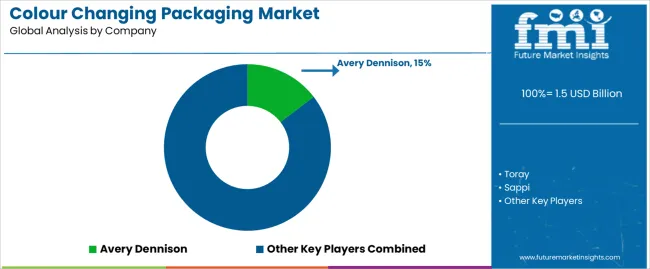
Leading companies are fighting for supremacy in the colour changing packaging market. Businesses are putting a lot of money into research and development to improve colour changing materials and technology. These results in a never-ending flow of creativity that pushes the limits of what can be achieved with packaging that changes colour.
Strategic mergers and acquisitions are shaping the market landscape. These moves allow companies to augment their resource base and expertise, accelerating the development of new and improved colour changing solutions. Additionally, leading players are introducing novel product lines tailored to specific market needs. This targeted approach caters to the diverse applications of colour changing packaging, attracting a wider consumer base across various industries. A vibrant and competitive colour changing packaging market poised for significant growth.
Recent Industry Developments in Colour Changing Packaging Market
In terms of material, the industry is divided into plastic, paper, metal, glass, and biodegradable materials.
In terms of technology, the industry is segregated into thermal sensitive, humidity sensitive, chemical sensitive, and UV sensitive.
The industry is classified based on the end users, as food, beverages, pharmaceutical, cosmetics, agriculture, healthcare, and industrial chemical.
Key countries of North America, Latin America, Europe, East Asia, South Asia, Middle East and Africa (MEA), and Oceania have been covered in the report.
The global colour changing packaging market is estimated to be valued at USD 1.5 billion in 2025.
The market size for the colour changing packaging market is projected to reach USD 2.3 billion by 2035.
The colour changing packaging market is expected to grow at a 4.2% CAGR between 2025 and 2035.
The key product types in colour changing packaging market are plastic, paper, metal, glass and biodegradable materials.
In terms of technology, thermal sensitive segment to command 37.4% share in the colour changing packaging market in 2025.






Full Research Suite comprises of:
Market outlook & trends analysis
Interviews & case studies
Strategic recommendations
Vendor profiles & capabilities analysis
5-year forecasts
8 regions and 60+ country-level data splits
Market segment data splits
12 months of continuous data updates
DELIVERED AS:
PDF EXCEL ONLINE
Colour Cosmetics Market Size and Share Forecast Outlook 2025 to 2035
Coloured Gemstone Market Analysis - Size, Share, and Forecast 2025 to 2035
Colourless Polyimide Films Market
Water Colour Palette Market Trends and Forecast 2025 to 2035
Single Colour Pad Printing Machines Market Size and Share Forecast Outlook 2025 to 2035
Leading Providers & Market Share in Single Colour Pad Printing Machines
Paprika Colour Market Insights - Natural Colorants & Industry Demand 2025 to 2035
Annatto Food Colours Market Trends - Natural Pigments & Industry Growth 2025 to 2035
Oil-Dispersible Colours Market
Baby Changing Station Market Size and Share Forecast Outlook 2025 to 2035
Tire Changing Machines Market Size and Share Forecast Outlook 2025 to 2035
Baby Changing Light Market
Light-Changing Packaging Inks Market - Growth & Demand 2025 to 2035
Welding Torch and Tip Changing Robotic Station Market Growth – Trends & Forecast 2024-2034
Packaging Supply Market Size and Share Forecast Outlook 2025 to 2035
Packaging Testing Services Market Size and Share Forecast Outlook 2025 to 2035
Packaging Tubes Market Size and Share Forecast Outlook 2025 to 2035
Packaging Jar Market Forecast and Outlook 2025 to 2035
Packaging Barrier Film Market Size and Share Forecast Outlook 2025 to 2035
Packaging Films Market Size and Share Forecast Outlook 2025 to 2035

Thank you!
You will receive an email from our Business Development Manager. Please be sure to check your SPAM/JUNK folder too.
Chat With
MaRIA